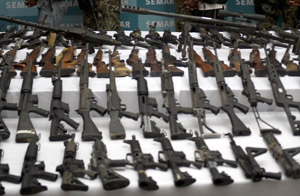
Could the NRA’s opposition to an arms trade treaty have consequences for US security?
There are many confusing messages coming from the National Rifle Association with regard to the effort to forge a global arms trade treaty. The NRA poo-poos arguments that point to the incredible human suffering the unregulated global arms trade is causing, including the thousands of children who are forced to become soldiers. The NRA also continues to deliberately and falsely claim that the treaty will undermine gun rights in the United States, in spite of the fact that the draft treaty text from the July United Nations conference reiterates that the treaty’s ambit is the arms trade between nations, not within them.
Underpinning the NRA’s view of the treaty and the world is that any effort to restrict small arms and conventional weapons is bad, as it undermines individual security, which can only be safeguarded by arming the “good guys.” If this is the case, then what does the NRA have to say about the recent events that transpired in Algeria and are still unfolding in Mali?
Mali’s chronic Touareg separatist insurgency morphed into the seizure of the northern half of the country in late 2012, when the Touareg allied themselves with Al-Qaida in the Islamic Maghreb (AQIM), an armed extremist Islamic group bent on establishing a state based on strict implementation of Sharia law and creating a new front against the enemies of Al-Qaida. It is arguable that successful seizure of half of the country had as much to do with the enhanced military capacity of rebels as it did the performance of the Malian armed forces. But while details are still being unearthed, most experts believe that this critical military firepower came from Libya, following the fall of Gadhafi.
The fact that the Touareg have fallen out with their new military partners and that French and Malian armed forces are now pushing their way north and retaking the country, still leaves the people of northern Mali bearing the brunt of the harsh implementation of an extremist interpretation of Islam. At the same time, while it is probable that the French military intervention will eventually oust AQIM from Mali, many governments including the Obama administration, are extremely worried that they will just move on and spread their armed struggle to Niger, Mauritania and even Northern Nigeria in the process building more launch pads for Al-Qaida and other armed groups.
One of the connecting lines between what was once a simmering separatist movement in a desolate part of West Africa and the specter of the entire Sahel region sprouting Al-Qaida spin offs is the proliferation of small arms. If a regional conflagration sounds alarmist, the same stream of trafficking that is propelling AQIM appears to have also contributed to the bloody hostage crisis in Algeria.
Those who hoped that things would improve after the fall of Muammar Gadaffi – who after amassing his own arsenal, went on to arm groups in Chad, Sierra Leone and Liberia –were given a rude awakening about why we need a robust Arms Trade Treaty. Clearly, no one thought about the potential flow of weapons from Libya to Mali, and if they did, no effective action was taken to prevent it from happening. A year later, the African Union, the UN, France and the United States are concerned enough that a military force is already in Mali, driving out AQIM and plans are urgently being pushed to have a larger African force in place in Mali before the end of the year.
In a world run by the NRA, there would be no restrictions on the sale, gift, and transfer of small arms or conventional weapons. Arms brokers would be able to sell their wares to people like Muammar Gadhafi, and they would eventually end up in the hands of people like Charles Taylor of Liberia or Mokhtar Belmokhtar who orchestrated the hostage raid in Algeria. The NRA’s leaders may not know or care who these men are, but clearly the rest of the world and the US Secretaries of State and Defense know the kind of mayhem that they could cause should they continue to have the ability to purchase missiles and assault guns over espresso.
No one can know definitively whether an ATT would prevent any of these men or others from acquiring arms, wreaking havoc on people and becoming a major threat to stability. But at the very least, the ATT could slow down these transfers, and make the easy availability of weapons to human rights abusers a little more difficult and save some lives in the process.
On the other hand, the ATT could be the difference between peacefully resolving an internal struggle over inclusion, decision-making and economic marginalization and facing the spread of Al-Qaida in a region where shortcomings in governance and human rights are intertwined with shortcomings in military capacity. We won’t know unless we try. If opposing extremist forces is in the interest of the United States, then ending the laissez faire trafficking in small arms and conventional weapons should be just as important.
Sometimes doing the right thing is also the smart thing.
